|
November 29, 2012 - No. 151
Contract Ratification Process of
Canadian Union of Postal Workers
Condemn Direct Intervention of
Canada Post Executives
Contract
Ratification Process of Canadian Union of Postal Workers
• Condemn Direct Intervention of Canada Post
Executives
Organized Workers
Fight to Restrict Labour Market
• Abolish the Temporary Foreign Worker Program!
- K.C. Adams
UN General Assembly
• Historic Palestine Vote - Nathan
J. Freeman
Crimes of
International Financial Oligarchy
• Horrific Mass Workplace Deaths in Bangladesh
- Pritilata Waddedar
Contract Ratification Process of Canadian
Union of Postal Workers
Condemn Direct Intervention of
Canada Post Executives
Without any scruples, Canada Post executives have used
their privileged
positions in control of the publication of the company accounts to
pressure postal workers to vote yes to the proposed neo-liberal
concessionary collective agreement. The anti-worker diatribe in the 3rd
quarter report says, "A failure to ratify could worsen Canada Post's
significant challenges and make aspects of the tentative agreements
unaffordable."
In this way, company executives used the 3rd quarter
financial
results to launch a hateful diatribe against postal workers and their
legitimate claims on the value they produce. The executives also used
the occasion to present as hopeless the future facing Canada Post as a
viable public enterprise unless postal workers agree not to exercise
their rights as the actual producers, give up the struggle to affirm
their rights and the rights of Canadians to a vibrant nation-building
public postal service and through a voluntary yes vote to the
neo-liberal concessionary contract deepen the process of a gradual
return to pre-war wages, pensions, benefits and working
conditions and the wrecking and privatization of Canada Post.
The CUPW executive is within its rights to suspend
immediately all
voting on the proposed neo-liberal concessionary contract and launch a
battle to denounce the company executives for abuse of privilege and to
demand they retract the 3rd quarter report and write a new one that
does not interfere in the internal affairs of postal workers.
 The present neo-liberal
direction of Canada Post that
turns a public service over to private interests and uses technological
developments to attack the rights of the working class is a matter of
concern for all Canadians. Canadians want to find ways to utilize
technological developments to enliven their nation-building project to
serve public interests and the general interests of society. They do
not accept the use of developments in technology to abuse the actual
producers and line the pockets of privileged private investors from the
international financial oligarchy. The present neo-liberal
direction of Canada Post that
turns a public service over to private interests and uses technological
developments to attack the rights of the working class is a matter of
concern for all Canadians. Canadians want to find ways to utilize
technological developments to enliven their nation-building project to
serve public interests and the general interests of society. They do
not accept the use of developments in technology to abuse the actual
producers and line the pockets of privileged private investors from the
international financial oligarchy.
Canada Post has never been a burden on the public
treasury and never will be if it rejects the neo-liberal line of
attacking the working class and turning the most remunerative portions
of the business over to the privileged private interests of the
financial oligarchy. The 3rd quarter report presents the situation
confronting Canada Post not as one to discuss with workers and
Canadians how to enhance its productive public service but as one to
attack postal workers, wreck the company and privatize those aspects of
the business that generate the greatest return.
Canada needs a new
direction for the economy not the tired neo-liberal defeatist cries for
austerity and abuse of the working class. Instead of nation-wrecking,
attacking workers, and handing over public assets to private interests,
postal executives should be leading Canadians in discussion of a new
nation-building direction for our public postal service towards:
- an expansion of services
to guarantee one or two-day
parcel delivery to all Canadian residences and businesses;
- one day delivery targets for all transaction mail,
which could include its own national airline service for passengers,
parcels, mail and other freight to all Canadian airports, and high
speed rail service (carrying passengers, mail and parcels) to all major
centres in all regions;
- better advertising tools for all businesses including
its own design, production and public relations division;
- postal outlets in all communities, which could include
public banking and insurance services backed by the enterprise,
- and a full range of digital and e-commerce services
with its own national internet buying and distribution centre of new
and used commodities.
The anti-worker diatribe in the 3rd quarter report is a
direct attack on the dignity of postal workers, the value they produce
and the future of Canada Post. Contrary to the ravings of the
executives, the human factor at Canada Post, when its rights are
recognized and its dignity upheld as the producer of postal value, is
what will develop the public enterprise in the twenty-first century and
beyond. A great viable future serving the Canadian people and economy
is possible if the actual producers are provided Canadian-standard
livelihoods and working conditions agreeable to themselves, and are not
abused, blocked and stymied in building the public enterprise and
having a say in the decision-making process to determine a new
pro-social pro-Canadian direction.
A first step would be to suspend voting on the
neo-liberal concessionary contract and publicly denounce Canada Post
executives, demand they rewrite the 3rd quarter report without their
anti-worker abuse and stop using their privileged positions to pressure
postal workers and interfere with their right to make up their own
minds.
 On this matter it is
unconscionable that company executives threw the so-called "solvency
deficit" of the pension plan into the faces of postal workers and so
much as accused them of destroying the plan if they do not vote yes to
the neo-liberal concessionary contract. Shame on those executives who
are utterly contemptible for their anti-social anti-worker words and
actions. On this matter it is
unconscionable that company executives threw the so-called "solvency
deficit" of the pension plan into the faces of postal workers and so
much as accused them of destroying the plan if they do not vote yes to
the neo-liberal concessionary contract. Shame on those executives who
are utterly contemptible for their anti-social anti-worker words and
actions.
Postal workers for many decades have been in the
forefront of standing up for Canada, its public institutions and
working class. An expectation has grown in the minds of many Canadians
that postal workers with their customary courage are a beacon of hope
and resistance in confronting the neo-liberal attacks of the financial
oligarchy. Let us turn that expectation into reality by taking the
initiative to suspend the vote based on the executives' gross
interference and use the time to deepen the discussion and campaign to
vote no to this neo-liberal concessionary contract.

Organized Workers Fight to Restrict
Labour Market
Abolish the Temporary Foreign Worker Program!
- K.C. Adams -

The organized working class movement cannot make headway
without a conscious struggle to restrict the labour market. The
restriction of the labour market occurs with the expansive organization
of unions at workplaces across the country. With organization and
structure workers can win equilibrium with owners of capital on issues
of wages, benefits and working conditions such as seniority and the
condition that all employed workers at the workplace receive similar
wages, benefits and working conditions, pay dues to sustain the union
and are encouraged to engage actively and consciously in the local
union's affairs and the political affairs of the country. The
recognition of the rights of workers both as individuals and as a
collective is a condition for equilibrium at the workplace and can only
be guaranteed through the organized resistance of the working class
movement.
The restriction of the labour market occurs politically
when the organized working class movement fights to hold governments to
account to bring into being and enforce laws that restrict the labour
market at particular workplaces where workers have organized into a
union and more broadly in society. Recognition of the rights of the
working class politically is a condition for equilibrium in the country
rather than open class warfare and continual disruption.
An example of a political
fight to restrict the labour market is found in the struggle to
dismantle the Harper dictatorship's Temporary Foreign Worker
Program (TFWP). The TFWP is a blatant example of owners of
capital using political institutions to craft legislation to serve
their private interests. The TFWP is a form of human trafficking of
workers internationally to expand the labour market to drive down
wages, benefits and working conditions, and to weaken the organizations
of the Canadian working class. The TFWP creates insecurity and
disequilibrium. The organized working class movement must fight for
immediate abolition of the TFWP.
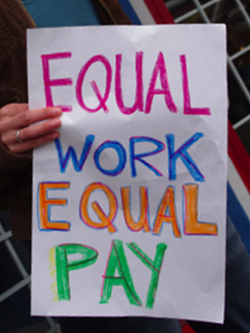 Public authorities must
find ways to guarantee
livelihoods and security of employment for all Canadians before turning
to immigration to secure workers. This can be done through expanding
public services, public enterprises and public infrastructure and
strengthening the public education and training system so that the
youth are prepared properly to assume their rights and responsibilities
as workers and citizens, and that upon finishing their education find
employment consistent with their capabilities at Canadian standard
wages, benefits and working conditions. Public authorities must
find ways to guarantee
livelihoods and security of employment for all Canadians before turning
to immigration to secure workers. This can be done through expanding
public services, public enterprises and public infrastructure and
strengthening the public education and training system so that the
youth are prepared properly to assume their rights and responsibilities
as workers and citizens, and that upon finishing their education find
employment consistent with their capabilities at Canadian standard
wages, benefits and working conditions.
All workers in Canada have rights by virtue of being the
producers of all value and providers of all services. All people in
Canada have rights by virtue of being human beings. The TFWP is in
direct violation of these principles and must be abolished. The
organized working class movement has the duty and social responsibility
to exercise its right of a say and control over the decision-making
process on all issues including all aspects of immigration and its
relation to the dialectic of the labour market.
Immigration itself, other than for family unification or
refugees from war, must be judged within the dialectic of the labour
market and the struggle between its restriction and expansion.
Immigration should only be allowed when the capitalist system has
achieved a rate of unemployment below one per cent in all regions.
Workers brought in under the TFWP are vulnerable,
insecure, susceptible to exploitation and very difficult to organize
into permanent unions exactly because of their vulnerable and
precarious legal position within Canada. Their rights as workers are
not recognized as a prior legal condition of their acquiring employment
and entering Canada. This is unacceptable.
 The TFWP and immigration
generally are political weapons in the dialectic between the organized
working class movement fighting to restrict the labour market and
owners of capital fighting to expand the labour market. The TFWP is a
political refusal of the owners of capital and their government
representatives to recognize that all workers have rights that must be
recognized by those in authority without exception. The existence of
the TFWP is proof that the working class is excluded from the
decision-making process concerning immigration directly harming the
rights of all. This must change! The TFWP and immigration
generally are political weapons in the dialectic between the organized
working class movement fighting to restrict the labour market and
owners of capital fighting to expand the labour market. The TFWP is a
political refusal of the owners of capital and their government
representatives to recognize that all workers have rights that must be
recognized by those in authority without exception. The existence of
the TFWP is proof that the working class is excluded from the
decision-making process concerning immigration directly harming the
rights of all. This must change!
The TFWP is also a state-organized weapon to incite
racism and divisions amongst the Canadian working class and as such
should be condemned as vile and backward. State-organized racism has
long been used in Canada to weaken the struggle of the organized
workers to restrict the labour market and defend their rights.
State-organized racism denies the rights of workers both as workers and
as human beings creating disequilibrium within society and should be
condemned and outlawed. State-organized racism is further reason why
the TFWP must be abolished at once under all circumstances and replaced
with renewal of immigration where the public authorities and employers
recognize both the rights of Canadian workers to a livelihood and
security and the rights of immigrant workers as soon as they take up
residence or employment. For this to come into being, the organized
working class must fight for the political power of a say and control
over the decision-making process regarding immigration.
Organize
to restrict the labour market!
No to human trafficking and indentured labour!
Abolish the Temporary Foreign Worker Program!
All workers have rights by virtue of being the producers of all value
and providers of all services!
All people have rights by virtue of being human!

UN General Assembly
Historic Palestine Vote
- Nathan J. Freeman -
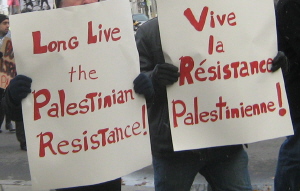 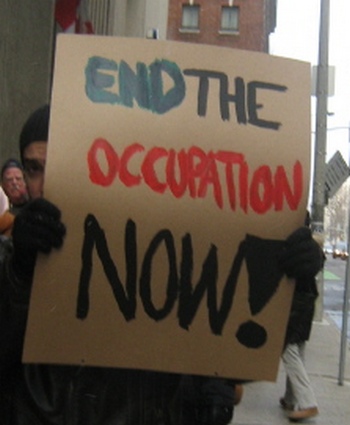 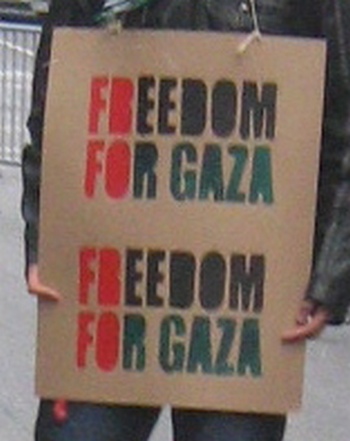 Ottawa, November 24, 2012
Ottawa, November 24, 2012
The Canadian working class and people stand firmly on
the side of the Palestinian people's struggle for the recognition of
their national rights.
On Thursday, November 29, the United Nations General
Assembly is expected to vote in favour of a resolution upgrading the
status of the Palestinian National Authority (PA) -- from that of an
observer to that of a non-member state endowed with membership-seeking
privileges among any of the numerous United Nations agencies.[1]
Various projections have been published of the favourable vote that the
PA can expect; one predicts a majority of votes in favour of the
resolution.
Last year, after an earlier version of this idea was
subverted by the United States in the Security Council, most doubted
that further progress on this front could be expected for some time
into the future.
For the last year and more, the Israeli government has
striven to disappear this entire resolution and debate. The United
States also tried to twist the arms of numerous UN member states to
either speak in defence of Israel or at least abstain from voting in
favour of this resolution. Despite these efforts, this week the
governments of France and the United Kingdom announced that they will
support the resolution. Canada under the vehemently pro-zionist Harper
government, stated its virulent opposition to the resolution.
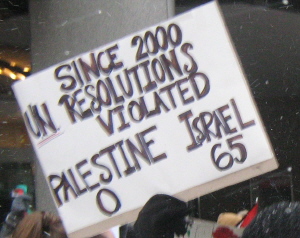 The selection of the
debating and voting date is historic. November 29, 2012 marks the 65th
anniversary of the historic Resolution 181 by which means the United
Nations General Assembly created the future State of Israel on 56 per
cent of the physical territory of British Mandate Palestine. It also
envisioned an Arab Palestinian state for the other 44 per cent. Each
piece of the partition was supposed to have Jewish and Palestinian
majorities respectively. Under Resolution 181, they were even supposed
to fulfill a 10-year economic union. The selection of the
debating and voting date is historic. November 29, 2012 marks the 65th
anniversary of the historic Resolution 181 by which means the United
Nations General Assembly created the future State of Israel on 56 per
cent of the physical territory of British Mandate Palestine. It also
envisioned an Arab Palestinian state for the other 44 per cent. Each
piece of the partition was supposed to have Jewish and Palestinian
majorities respectively. Under Resolution 181, they were even supposed
to fulfill a 10-year economic union.
The ink wasn't even dry on Resolution 181 before the
Zionists set about importing British-trained troops, aircraft for
terrorizing Palestinian villagers and townspeople, pushing hundreds of
Palestinian villagers to the bottom of village wells, rounding up
hundreds of women and children (as at Deir Yassin outside Jerusalem)
for firing squad-style executions. After dispersing more than 750,000
Palestinians from their home towns and villages, the Zionists declared
Israel as a Jewish state on a territory 40 per cent larger than
Resolution181 had provided.
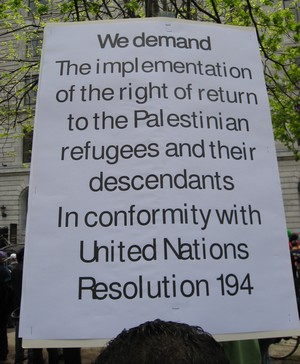 The UN vote this week
comes as the Zionist capacity to sustain wanton killing and mayhem
seems to shorten with each homicidal outburst. Indeed, the British and
French support for the PA's quest for non-member status, and the public
endorsement of the latest General Assembly resolution on Palestinian
status by the Islamic Resistance Movement Hamas, are all products of an
event that Israel and its U.S. armourers and interference-runners never
anticipated: the waging of tit-for-tat armed resistance by the Gaza
Strip against the fourth-strongest army on the earth to an extent that
compelled the Israelis to sue for a ceasefire after just eight days.
Compare the situation in July-August 2006, when the Zionist assault on
Lebanon and its Hezbollah resistance killed and injured tens of
thousands of mostly Lebanese civilians for 34 days before the U.S.
finally dropped its objections to a UN-monitored ceasefire. Or even
more remarkably, compare the December 2008-January 2009 rampage, in
which the Israeli armed forces killed 1,500 and wounded another 4,000
in Operation Cast Lead, over a period of 22 days -- right up to the
inauguration of President Barack Obama. The UN vote this week
comes as the Zionist capacity to sustain wanton killing and mayhem
seems to shorten with each homicidal outburst. Indeed, the British and
French support for the PA's quest for non-member status, and the public
endorsement of the latest General Assembly resolution on Palestinian
status by the Islamic Resistance Movement Hamas, are all products of an
event that Israel and its U.S. armourers and interference-runners never
anticipated: the waging of tit-for-tat armed resistance by the Gaza
Strip against the fourth-strongest army on the earth to an extent that
compelled the Israelis to sue for a ceasefire after just eight days.
Compare the situation in July-August 2006, when the Zionist assault on
Lebanon and its Hezbollah resistance killed and injured tens of
thousands of mostly Lebanese civilians for 34 days before the U.S.
finally dropped its objections to a UN-monitored ceasefire. Or even
more remarkably, compare the December 2008-January 2009 rampage, in
which the Israeli armed forces killed 1,500 and wounded another 4,000
in Operation Cast Lead, over a period of 22 days -- right up to the
inauguration of President Barack Obama.
Once again, the Canadian working class and people stand
firmly on the side of the Palestinian people's struggle for their
national rights.
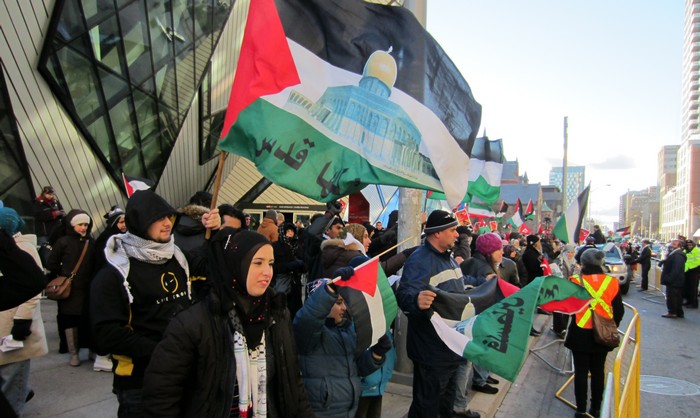 Toronto, November 24, 2012
Toronto, November 24, 2012
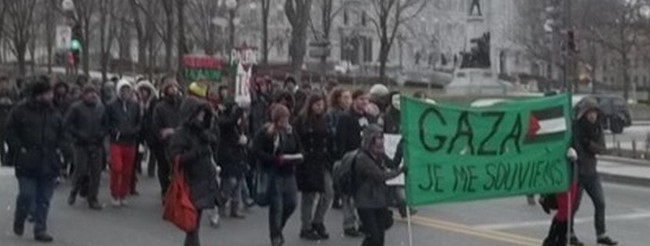 Quebec City, November 25,
2012
Quebec City, November 25,
2012
Note
1. One of the agencies of some interest to the
Palestinian National Authority is the International Criminal Court at
The Hague. Depending on evidence that PA officials might bring, this
court could exercise its universal international jurisdiction to
prosecute Israeli government officials for specific war crimes
committed by the illegal military occupation of the West Bank and Gaza
Strip.

Crimes of International Financial
Oligarchy
Horrific Mass Workplace Deaths in Bangladesh
- Pritilata Waddedar-
 Demonstration in Dhaka in
2006 to protest mass deaths of workers.
Demonstration in Dhaka in
2006 to protest mass deaths of workers.On November 24 workers throughout the world were again
horrified and outraged by mass workplace deaths of workers in a
Bangladesh textile factory fire. This mass killing of workers, along
with many other mass workplace deaths in other low-wage countries, is a
consequence of neo-liberal globalization. These deaths constitute a
crime against humanity by the international financial oligarch and the
global retailing monopolies with the complicity of the Bangladesh
government and the local elite.
The latest Bangladesh factory fire broke out in a
garment factory in the Ashulia industrial area near the capital city
Dhaka. More than 120 workers were killed in the fire and hundreds of
others were injured. Many of the deaths were caused by all the factory
doors being locked, a common practice used by factory owners to prevent
workers from leaving their work stations. Other deaths resulted when
workers fell from the multi-story building while trying to escape the
fire. Almost all of the workers who died were women and girls.
Similar incidents involving fires or the collapse of
factory building occur frequently in Bangladesh and other low wage
countries with only the most horrific reported by the international
media. Less than two years ago another factory fire in Ashulia resulted
in the deaths of 30 workers and hundreds of injuries. In a single week
in February 2006, there were mass deaths of workers in two separate
factory fires and the collapse of new nine-story factory in Chittagong,
Bangladesh. The government covered up the number of fatalities and
injuries in these three incidents but labour organizations report that
300
workers were killed in the week's catastrophes including several girls
only 12 years old.
Similar incidents also occur regularly across the Indian
sub-continent and in other countries. In Pakistan, a total of 389
workers were killed in two textile factory fires in Karachi and Lahore
on the same day this September. The same month, 40 textile workers
were killed in a fire in Tamil Nadu State in southern India.
Almost all the mass deaths of textile workers in
Bangladesh occur in the factories producing ready-to-wear garments
(RTWG) for international retail monopolies like Wal-Mart and Gap Inc.
In contrast to fabric manufacturing which is highly mechanized, the
RTWG sub-sector is labour intensive and operated by local entrepreneurs.
RTWG workers produce a huge amount of wealth, but
neo-liberal globalization works in a way that channels most of this
wealth to powerful global monopoly groups. Factory owners have beaten
down workers' wages below what is needed to sustain life and have
imposed working conditions which put workers' lives in constant risk.
The monopoly manipulation of prices by the global retail monopolies and
high interest charged by the international financiers also restrict the
profits of local entrepreneurs. Even the claim of government on the
wealth in the form of taxes is restricted by the constant threats the
powerful monopolies that they will move production to another country.
Almost all the wealth produced by millions of workers in the sector
flows to the vaults of the global monopolies.
In the case of Bangladesh, the government and the local
elite have been aggressively pursuing the expansion of the RTWG by
ensuring that Bangladeshi textile workers are the lowest paid in the
world. Bangladesh is now the world's second largest exporter of RTWG
products after China. Exports of RTWG products from Bangladesh have
increased from $5 billion a year in 2000 to $19 billion in 2012 and now
make up 80 per cent of Bangladesh export revenue.
There are now 2.2 million workers employed in the 5,000
RTWG factories in Bangladesh many of which are located in special
industrial export zones where the government allows factory owners rule
over workers with impunity. Even those factories outside the export
zones are in thoroughly militarized districts. Because the entire
Bangladesh balance of trade depends on RTWG exports, the government has
declared workers' resistance to brutal exploitation and inhuman working
conditions to be "a threat to national economic security." Suppression
of workers' rights and resistance is the government's highest priority.
In 2004 a heavily armed para-military police force was
established to suppress workers resistance, the Rapid Action Battalion
(RAB). The British trained RAB has been involved in frequent battles
with workers and has been repeatedly implicated in assassination and
disappearance of workers' movement leaders.
Despite the repression by the RAB, the workers'
resistance
developed along with the expansion of the RTWG sector. In 2010 hundreds
of thousands of textile workers joined a powerful strike movement in
response to rising food prices, to mass deaths of workers at factories
and also in response to the murder and disappearance of militant
workers by the RAB.
The government tried to suppress the strike movement by
establishing the 3,000 member Industrial Police Force in 2010 for
day-to-day surveillance and control of workers in the industrial areas.
Several workers were killed by the Industrial Police and the RAB in
these
demonstrations but in the end the government was forced to raise the
textile worker wages from $20 per month to $38 per month in 2010.
Workers are continuing to clash with police and factory
owners in actions to defend their rights and the dignity of labour.
During the past summer action by 500,000 workers to defend militant
workers attacked by the police resulted 350 factories in the Ashulia
district being shut down. Strike action was taken in several locations
during the summer over rising rents and food costs and over several
cases of abuse of women workers by factory managers.
In recent days, workers have been angrily demonstrating
in many districts over the November 24 fires. In coming days
demonstrations are planned for Dhaka to denounce the government for
allowing this massacre of workers by factory owners and the
international retail monopolies.
Top: Textile workers confront Rapid Action
Battalion in Ashulia in June 2012. Bottom: Workers mass picket of
Ashulia
industrial district during lockout by factory owners in June 2012.
 Demonstration in Karachi,
Pakistan to protest mass deaths of workers in factories
Demonstration in Karachi,
Pakistan to protest mass deaths of workers in factories

Read The
Marxist-Leninist
Daily
Website: www.cpcml.ca
Email: editor@cpcml.ca
|

